Share

I Must Be BUG'N
It Must Be a Conversation with Dr. Matt
Episode Transcript (provided by Riverside - forgive any errors)
In this previously recorded episode, I speak with Dr. Matt Zakreski, a clinical psychologist specializing in neurodivergence and giftedness. We explore the complexities of being neurodivergent, the importance of self-discovery, and the need for supportive environments for gifted individuals. Dr. Matt shares his personal experiences as someone who was identified as gifted early but had to wait several years to be diagnosed with ADHD. The discussion highlights the challenges faced by neurodivergent individuals and the necessity of creating inclusive spaces that recognize and nurture diverse talents. We also discuss the significance of DEI work, the need for community and connection, and the role of self-awareness in navigating systemic issues that impact us all. This is a great start to our discussion that we will pick up again in the new year. Take a listen and check out Dr. Matt's book via the link below as well.
Stay in contact with Dr. Matt:
Helpful Links:
- Grab Dr. Matt's Book!
- Hire me to speak or buy some merch!
- Community for Black Gifted Adults - Our Wild Minds - Use code "Sheldon"
- Umbrella US - Non-profit focused on neurodivergent advocacy
- ND Connect - Online community for neurodivergent people
- Submit your Questions or Misunderstood Insights
Intro and Outro music provided by byrdversion1 - "It Couldn't Be" from the album Nevermore
More episodes
View all episodes
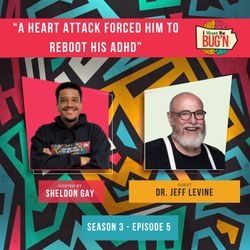
5. A Heart Attack Forced Him to Reboot His ADHD
01:12:25||Season 3, Ep. 5Episode Transcript (provided by Riverside - forgive any errors): https://docs.google.com/document/d/1rNjh4fS_StpHON-a-EEk_n_dH4hGK46s0EPe5o5U2Qc/edit?usp=sharingFollow I Must Be BUGN on IG @sheldongayisbugnSummary:In this episode, I speak with Dr. Jeff, an expert helping people with ADHD transform their lives, especially in the workplace. We discussed Dr. Jeff's personal journey with ADHD, the challenges he faced, and how he developed a system to help others harness their ADHD. He tells us about being saved from wandering into the street, teaching himself to code, how Adderall was helpful until he had a heart attack and couldn't take it anymore and much more. Dr. Jeff helps us see how humor can bring peace with our journey. Key Points:ADHD doesn't have to be viewed as a deficitHow accountability can help change habits and achieve goals.Self-compassion is key; failure is not a reflection of one's worth.Mindset shifts can transform one's approach to challenges.Community support enhances personal growth and accountability. Understanding ADHD can lead to better career choices.Living with uncertainty can heighten adrenaline and dopamine levels.Being able to laugh at life can help us find a way throughCreating supportive environments can enhance productivity.Helpful Links:Email Dr. Jeff: Drjeff@Drgetinfocus.comSchedule a call with Dr. Jeff: https://drgetinfocus.com/schedule-page (for clarity Kick-start session)Video about study demonstrating racial disparity in hiring: https://www.instagram.com/reel/DG1grIqvz_N/Hire me to speak or as your personal coach! sheldongayisbugn.comFree GroupMe Community for Talented and Gifted adults: https://groupme.com/join_group/108040800/igLaxqNGND Connect - Online community for neurodivergent people: ndconnect.appUmbrella ND - Non-profit focused on neurodivergent advocacy: https://umbrellaopensdoors.org/Submit your Questions or Misunderstood Insights: https://docs.google.com/forms/d/e/1FAIpQLSelanG1R71TcGjzHIyVW1f8fkE7MaWx-D2j7OtHsIGrdQhi_Q/viewform?usp=sf_linkKeywords: ADHD, neurodivergence, superpower, productivity, accountability, mindset, personal growth, mental health, self-awareness, SchlemielIntro and Outro music provided by byrdversion1 - "Understand" from the album Nevermore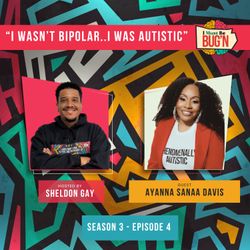
4. I Wasn't Bipolar...I Was Autistic
52:35||Season 3, Ep. 4Episode Transcript (provided by Acast - forgive any errors): https://docs.google.com/document/d/1ujE9yulu1kvNze2q99xDQO4qvt_pUdr0ISkiX_xhPtI/edit?usp=sharingFollow I Must Be BUGN on IG @sheldongayisbugnSummary:In this episode, we speak with Ayanna Sanaa Davis, an award-winning autism advocate, discussing her unique journey as a Black autistic woman. She shares about her misdiagnosis where she was erroneously institutionalized as well as how art has given her a voice, even when she hasn't wanted to verbalize. She even shares about the time she experienced physical violence in the classroom because someone lacked compassion for her neurodivergence. We explore the importance of representation, the journey to diagnosis, the impact of race on autism, and the cultural aspects of neurodivergence. The conversation emphasizes the need for empathy and understanding in a world that often overlooks the unique experiences of neurodivergent individuals.Key Points:Neurodivergent advocacy is evolving beyond just accommodations.Art is a beautiful outlet for expressing emotions and thoughts.Representation is crucial for Black autistic individuals, especially young ones.Being undiagnosed can lead to a lifelong search for identity.Cultural aspects significantly influence the experience of autism.Autistic burnout is distinct and can have lasting effects.Community support is essential for neurodivergent individuals.Empathy is needed to understand the challenges faced by neurodivergent people.Race plays a critical role in the experiences of autistic individuals.Education on neurodivergence should include cultural competence.Helpful Links:Follow Ayanna across ALL social platforms at @phenomenallyautisticConnect with Ayanna and all her projects: https://linktr.ee/PhenomenallyautisticHire me to speak or as your personal coach! sheldongayisbugn.comFree GroupMe Community for Talented and Gifted adults: https://groupme.com/join_group/108040800/igLaxqNGND Connect - Online community for neurodivergent people: ndconnect.appUmbrella ND - Non-profit focused on neurodivergent advocacy: https://umbrellaopensdoors.org/Submit your Questions or Misunderstood Insights: https://docs.google.com/forms/d/e/1FAIpQLSelanG1R71TcGjzHIyVW1f8fkE7MaWx-D2j7OtHsIGrdQhi_Q/viewform?usp=sf_linkKeywords: neurodivergence, autism, representation, black community, art, healing, social justice, advocacy, mental health, cultural aspects, bipolarIntro and Outro music provided by byrdversion1 - "Understand" from the album Nevermore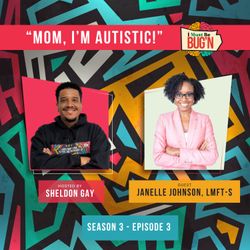
3. Mom, I'm Autistic - A conversation with Janelle Johnson, LMFT-S
01:28:38||Season 3, Ep. 3Episode Transcript (provided by Riverside - forgive any errors): https://docs.google.com/document/d/1nKIvlOlsje1bGu6wDyEdTNxG4Dfk2LKSMN3M_cPbkK8/edit?usp=sharingFollow I Must Be BUGN on IG @sheldongayisbugnSummary:In this episode, I had the pleasure of speaking with Janelle Johnson, LMFT-S, a licensed marriage and family therapist, as well as a neurodiversity and disability advocate. We had a good ole time discussing the future of intersectional neurodivergent advocacy, especially as it relates to race and gender. Janelle shared a POWERFUL personal story about her own self-diagnosis. Janelle shared about her critically important research and her vision for a future where neurodivergent leaders are prominent in various sectors, advocating for equity and representation. We also discussed the importance of self-reflections, especially as it relates to our own internalized ableism. We also discuss some of the challenges neurodivergent folks face in therapy, as well as some helpful tips for identifying the right therapist for you. Janelle also shared some truly striking stats from her research as it relates to what the true "face of autism" looks like now and in the future. She is an amazing thought-leader in this space and I'm super excited for you to listen to our discussion.Key Points:Neurodivergent advocacy is evolving beyond just accommodations.You can't speak about neurodivergence or disability without talking about race and gender.Self-diagnosis is valid and can be a powerful realization.Beatboxing can be a form of stimming for some individuals.Therapists need to understand the cultural context of their clients.Emerging data shows disparities in autism diagnoses among racial groups.Neurodiversity should be rethought beyond traditional labels.The future should include more neurodivergent leaders in various fields.Community is enough and has always been enough.Challenging internalized ableism is crucial for personal growth.Embracing one's identity can lead to joy and fulfillment.Nuance and intersectionality are vital in understanding diverse experiences.Helpful Links:Janelle's Mental Health Practice - Bridges Family Life Center: http://www.bridgesflc.com/Take the neurodivergent research survey, and share with your networks! https://ncsu.qualtrics.com/jfe/form/SV_3yOrtajDF32kG8eMalcolm X quote on Black women: https://speakola.com/political/malcolm-x-speech-to-black-women-1962Neurodivergent Therapist Database: https://ndtherapists.com/Hire me to speak or as your personal coach! sheldongayisbugn.comFree GroupMe Community for Talented and Gifted adults: https://groupme.com/join_group/108040800/igLaxqNGND Connect - Online community for neurodivergent people: ndconnect.appUmbrella ND - Non-profit focused on neurodivergent advocacy: https://umbrellaopensdoors.org/Submit your Questions or Misunderstood Insights: https://docs.google.com/forms/d/e/1FAIpQLSelanG1R71TcGjzHIyVW1f8fkE7MaWx-D2j7OtHsIGrdQhi_Q/viewform?usp=sf_linkIntro and Outro music provided by byrdversion1 - "Understand" from the album Nevermore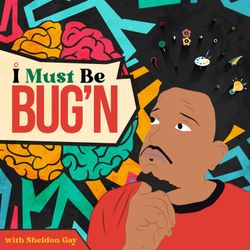
2. Why Anger is Necessary for Joy
56:27||Season 3, Ep. 2Episode Transcript (provided by Riverside - forgive any errors): https://docs.google.com/document/d/1DvxQW82DslhfTiUMwO0q8tBhsxxuLMdTYndyXqY1pmQ/edit?usp=sharingFollow I Must Be BUGN on IG @sheldongayisbugnSummaryIn this episode, I delve into the complexities of anger, highlighting a number of ways that its presence is a pathway to healthier relationships. I discuss the importance of investigating anger rather than suppressing it and, furthermore, how societal norms, especially those dictated by systems of oppression, create extra burdens for melanated and marginalized people. I also share how anger helped me discover I was gifted and how it can help you understand your mind as well. I then provide actionable steps for harnessing your anger constructively to transform your life and community.Key Points:Acknowledging anger is essential for manifesting joy.Understanding emotions is crucial for personal growth.Safety in relationships starts with Self.Healthy relationships require the ability to express anger constructively.Investigating anger can reveal deeper traumas and needs.We must create safe spaces for all emotions, including anger.Helpful Links:Josh Johnson uses humor to discuss angerHire me to speak or buy some merch!: sheldongayisbugn.comFree GroupMe Community for Talented and Gifted adults: https://groupme.com/join_group/108040800/igLaxqNGND Connect - Online community for neurodivergent people: ndconnect.appUmbrella ND - Non-profit focused on neurodivergent advocacy: https://umbrellaopensdoors.org/Submit your Questions or Misunderstood Insights: https://docs.google.com/forms/d/e/1FAIpQLSelanG1R71TcGjzHIyVW1f8fkE7MaWx-D2j7OtHsIGrdQhi_Q/viewform?usp=sf_linkIntro and Outro music provided by byrdversion1 - "Understand" from the album Nevermore
1. Is it a Neurodivergent Excuse or a Reason?
45:02||Season 3, Ep. 1Episode Transcript (provided by Riverside - forgive any errors): https://docs.google.com/document/d/1JKjcPA2Usu4lG5bYSKkLeUPB8Su5KGsRFNe87mXeFgE/edit?usp=sharingFollow I Must Be BUGN on IG @sheldongayisbugnSummaryIn this episode, I explore and explain something that can be a bit confusing, the difference between excuses and reasons. Many of us have seen this come up in our neurodivergent communities. It seems we run into challenges when sharing our intent and thought process. It's frustrating because we want to improve and maintain our relationships. Through personal anecdotes and practical advice, I help you understand how radical accountability and prioritizing connection can foster healthier relationships.Key Points:* Radical accountability involves taking ownership of one's actions and their impact.* Healthy relationships require prioritizing connection over being right.* Modeling healthy behavior can help others learn how to communicate effectively.* Being an elite apologizer means acknowledging impact first, then intent.* Personal growth involves recognizing our own triggers and patterns.Helpful Links:* Hire me to speak or buy some merch!: sheldongayisbugn.com* Free GroupMe Community for Talented and Gifted adults: https://groupme.com/join_group/108040800/igLaxqNG* ND Connect - Online community for neurodivergent people: ndconnect.app* Umbrella ND - Non-profit focused on neurodivergent advocacy: https://umbrellaopensdoors.org/* Submit your Questions or Misunderstood Insights: https://docs.google.com/forms/d/e/1FAIpQLSelanG1R71TcGjzHIyVW1f8fkE7MaWx-D2j7OtHsIGrdQhi_Q/viewform?usp=sf_linkIntro and Outro music provided by byrdversion1 - "Understand" from the album NevermoreIcons from flaticon.com * Like (https://www.flaticon.com/free-icons/like)* Bell (https://www.flaticon.com/free-icons/bell)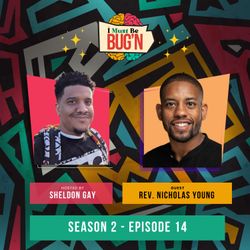
14. It Must Be a Conversation with Rev. Nicholas Young
01:04:50||Season 2, Ep. 14Episode Transcript (provided by Riverside - forgive any errors)Follow I Must Be BUGN on IGSummaryIn this episode, I have a powerful conversation with Reverend Nicholas Young about the intersections of faith, mental health, and the unique challenges faced by gifted and otherwise neurodivergent people. We touch on the importance of community, the role of grief in both ministry and therapy, and how to continue to center love and connection in a world filled with so many challenges. We also talk about the importance of working with Black boys to give them the things we wish we had as children. This is an important discussion for our community. Please connect with Nick and let me know what you think about this conversation!Key Points:The intersection of faith and mental health is crucial for holistic healing.Grief work is a significant part of both ministry and therapy.Community plays a vital role in combating loneliness, especially for gifted individuals.Creating safe spaces for Black boys is essential for their emotional well-being.Love and connection are fundamental to overcoming life's challenges.Gifted individuals may feel isolated and misunderstood in traditional settings.It's important to honor each person's unique experiences and needs.Therapists and ministers should work together to provide comprehensive support.Connect with Rev. Nicholas Young on socials at @nickyoungslifeHelpful Links:Hire me to speak or buy some merch!Free GroupMe Community for Talented and Gifted adultsCommunity for Black Gifted Adults - Our Wild Minds Umbrella ND - Non-profit focused on neurodivergent advocacyND Connect - Online community for neurodivergent peopleSubmit your Questions or Misunderstood InsightsIntro and Outro music provided by byrdversion1 - "It Couldn't Be" from the album Nevermore
13. It Must Be the Lesson in the Mirror
48:59||Season 2, Ep. 13Episode Transcript (provided by Riverside - forgive any errors)Follow I Must Be BUGN on IGSummaryIn this episode, I explore the concept of being a mirror in relationships and how we can learn emphasizing the importance of self-reflection and personal growth. I delve into how our interactions with others can serve as mirrors, revealing lessons about ourselves. I discuss leveraging boundaries, the role of triggers in emotional responses, and the necessity of compassion for oneself and others. We talk a little James Baldwin and Rumi. This episode is about how we take more control of how we feel about our lives, spend less time bound by what happens around us and, ultimately, create amazing relationships that have more compassion, joy and safety.Key Points:Why being a mirror is critical to our best relationshipsLove involves magnifying each other's strengths and lightHow triggers reveal unresolved feelings from our past and a meaningful path forwardUsing self-reflection as a powerful tool for personal growthWhy boundaries are essential for protecting our emotional well-beingWhy validating our emotions as valid can serve as a guide for self-discoveryIncreasing our awareness of times when people are projecting their insecurities onto usHow investigating our own perceptions can lead to healthier relationshipsHelpful Links:Hire me to speak or buy some merch!Community for Black Gifted Adults - Our Wild Minds - Use code "Sheldon"Umbrella ND - Non-profit focused on neurodivergent advocacyND Connect - Online community for neurodivergent peopleSubmit your Questions or Misunderstood InsightsIntro and Outro music provided by byrdversion1 - "It Couldn't Be" from the album Nevermore
12. It Must Be Eugenics
34:10||Season 2, Ep. 12Episode Transcript (provided by Riverside - forgive any errors)Follow I Must Be BUGN on IGSummaryIn this episode, I discuss the recent proposal by RFK Jr. to create a database of autistic individuals, expressing deep concern over the implications of such a move. He emphasizes the importance of community, advocacy, and understanding the complexities surrounding autism and neurodivergence. Sheldon calls for collective action against systemic oppression and misinformation, urging listeners to remain vocal and supportive of marginalized communities.Key Points:The proposal to create a national database tracking autistic people is extremely problematicI acknowledge my privilege in choosing a neurodivergent label with less stigmaThe increase in autism diagnoses is due to better awareness, not an epidemic.This should be yet another reason we start taking data-privacy more seriouslyThe narrative around autism needs to be more inclusive and expansiveHelpful Links:What You Need to Know About the New Autism Data Registry2019 Study on ADHD Rates by Race/Ethnic GroupBackground of LebensbornHire me to speak or buy some merch!Community for Black Gifted Adults - Our Wild Minds - Use code "Sheldon"Umbrella US - Non-profit focused on neurodivergent advocacyND Connect - Online community for neurodivergent peopleSubmit your Questions or Misunderstood InsightsIntro and Outro music provided by byrdversion1 - "It Couldn't Be" from the album Nevermore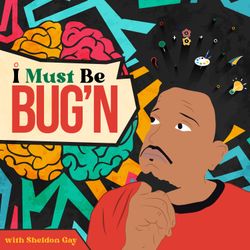
11. It Must Be My MEgo
01:09:08||Season 2, Ep. 11Episode Transcript (provided by Riverside - forgive any errors)Follow I Must Be BUGN on IGIn this episode, I take my time really digging into the concept of ego, exploring its role in self-awareness and personal identity. I discuss the importance of understanding the ego as both a source of strength and a potential obstacle. I briefly discuss Freud while leaning much more heavily on the thoughts of Mooji and my own thoughts about how we conceptualize our Self. I talk a bit about psychological theories and then continue my journey by discussing the nature of consciousness, identity, and the transient nature of our experiences. I really go into the complexities of identity, authenticity, and the role of ego in shaping our self-perception. I also make sure to frame this from a neurodivergent perspective, since that significantly shapes how we see and interact with the world. At the end of the day, this is a deep and complex conversation about how to become truly aware of our true Selves so that we can not just survive but thrive through the connections we foster from a truly authentic and unmovable place that isn't bound by current or past circumstances.Key Points:We are not our bodies or minds; they are vessels and lenses through which we experience Life.Ego can manifest as both strength and obstacle.Self-acceptance is crucial as we navigate change.We must challenge our perceptions of Self.Connection is fundamental to our existence and well-being.We often see others through the lens of our own experiences.Shame and guilt can prevent personal growth and acceptance.We are all interconnected, and our experiences shape our identities.Helpful Links:Mooji on "What is Ego?"Annaka Harris discusses the illusion of self and free willAudre Lorde - "Learning from the '60s""Ego Tripping" by Nikki GiovanniHire me to speak or buy some merch!Community for Black Gifted Adults - Our Wild Minds - Use code "Sheldon"Umbrella US - Non-profit focused on neurodivergent advocacyND Connect - Online community for neurodivergent peopleSubmit your Questions or Misunderstood InsightsIntro and Outro music provided by byrdversion1 - "It Couldn't Be" from the album Nevermore